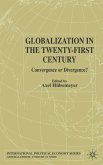New Systems Theories of World Politics uses systems theoretical approaches to analyze the structure and dynamics of the international system. Drawing from different systems theoretical traditions, it argues that the system of world politics can be analyzed in a comprehensive fashion by continuing the pioneering work of theorists like Karl Deutsch.
'This outstanding collection of superb essays offers a tour horizon of a new generation of systems theory, sociologically inspired for the most part, and different from the garden varieties of the 1960s and 1980s. One of the book's many virtues is to bring to the attention of a North American audience the important work of the German sociologist Nikolas Luhmann whose thoughts pervade several of the essays. Read against the recently ascendant rational choice research program, this collection instills confidence in the range and vitality of analytical complements and alternatives to reductionist forms of theory. Apart from informing scholars about a broad range of theoretical developments they may not have followed closely, this volume will also be an excellent teaching tool especially in graduate seminars.'
- Peter J. Katzenstein, Walter S. Carpenter, Jr. Professor of International Studies, Cornell University, USA
"This important and thought-provoking book augurs and promotes the renaissance of Systems Theory in International Relations. Consisting of a comprehensive and cohesive collection of chapters by some of today's leading international-systems theorists, this book's most important contribution is replacing classic systems theory with a novel form of systems theorizing. The latter builds on social complexity and non-equilibrium dynamics; relational, communication, and semantic analyses; institutional and cultural macro historical-sociological standpoints; and quantum physics-based systems theorizing. Pushing the theoretical frontier forward, and suggesting a new theoretical agenda for teaching systems theory, this book is essential reading for International Relations theorists across paradigmatic divides."
- Emanuel Adler, Andrea and Charles Bronfman Chair of Israeli Studies, University of Toronto, Canada
"This volume brings together many of the major non-individualist forms of theorizing - including agent-based and equation-based modeling, complexity theory, Luhmannian systems analysis, and relationalism - in one place, providing ample conceptual resources for scholars seeking to explore the vistas opened up when we lift our eyes from the micro level."
- Patrick Thaddeus Jackson, Associate Professor of International Relations, School of International Service at the American University, USA
"This edited collection offers a judicious and well thought-through consideration of the ultility and and relevance of system theories to contemporary engagements with global politics. The cogent analyses provided by the contributors offer a much-need indication of the ongoing transformations in the analysis of international relations. The astute examination offered in the volume makes it a valuable aid both for advanced undergraduate students grappling with the complexities of international life and scholars struggling with the turbulent patterns of world affairs. One only hopes that the thoughtfulaccount provided in this collection will inspire research of the same superb calibre."
- Emilian Kavalski, University of Western Sydney
- Peter J. Katzenstein, Walter S. Carpenter, Jr. Professor of International Studies, Cornell University, USA
"This important and thought-provoking book augurs and promotes the renaissance of Systems Theory in International Relations. Consisting of a comprehensive and cohesive collection of chapters by some of today's leading international-systems theorists, this book's most important contribution is replacing classic systems theory with a novel form of systems theorizing. The latter builds on social complexity and non-equilibrium dynamics; relational, communication, and semantic analyses; institutional and cultural macro historical-sociological standpoints; and quantum physics-based systems theorizing. Pushing the theoretical frontier forward, and suggesting a new theoretical agenda for teaching systems theory, this book is essential reading for International Relations theorists across paradigmatic divides."
- Emanuel Adler, Andrea and Charles Bronfman Chair of Israeli Studies, University of Toronto, Canada
"This volume brings together many of the major non-individualist forms of theorizing - including agent-based and equation-based modeling, complexity theory, Luhmannian systems analysis, and relationalism - in one place, providing ample conceptual resources for scholars seeking to explore the vistas opened up when we lift our eyes from the micro level."
- Patrick Thaddeus Jackson, Associate Professor of International Relations, School of International Service at the American University, USA
"This edited collection offers a judicious and well thought-through consideration of the ultility and and relevance of system theories to contemporary engagements with global politics. The cogent analyses provided by the contributors offer a much-need indication of the ongoing transformations in the analysis of international relations. The astute examination offered in the volume makes it a valuable aid both for advanced undergraduate students grappling with the complexities of international life and scholars struggling with the turbulent patterns of world affairs. One only hopes that the thoughtfulaccount provided in this collection will inspire research of the same superb calibre."
- Emilian Kavalski, University of Western Sydney








